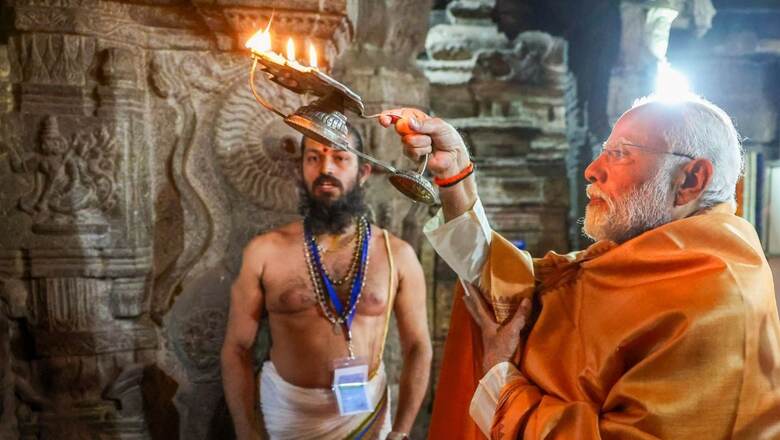
views
Will Prime Minister Narendra Modi be the ‘mukhya yajman’ for the pran pratishtha ceremony of the idol of lord Ram at the Ayodhya temple? Officials of the Shri Ram Janmabhoomi Teerth Kshetra Trust answered the question for News18, putting an end to the confusion.
While PM Modi will be the chief yajman on January 22 (Monday), Dr Anil Mishra and his wife have been nominated as the chief yajman for the six-day-long rituals prior to the pran pratishtha ceremony.
WHO IS A YAJMAN?
Yajman is a Sanskrit word, which refers to a person who performs a ritual during a religious ceremony.
“Dr Anil Mishra will perform all rituals leading to the pran pratishtha ceremony for six days as the chief yajman," said Champat Rai, vice-president of Vishwa Hindu Parishad (VHP) and general secretary of the Shri Ram Janmabhoomi Teerth Kshetra Trust.
On the day of the pran pratishtha, PM Modi will be the chief yajman, who will conduct the rituals inside the garbh griha of the Ram Temple, along with a few others. “The ceremony will be conducted in the presence of Prime Minister Narendra Modi, Rashtriya Swayamsevak Sangh (RSS) Sarsanghchalak Mohan Bhagwat, Governor of Uttar Pradesh Anandiben Patel and UP Chief Minister Yogi Adityanath," the trust said.
WHO IS ANIL MISHRA?
Mishra, who hails from Ayodhya, is one of the senior members of the trust, who has devoted his life to the Ram temple movement. He has spent 40 years in Kar Sewa.
Born in UP’s Ambedkar Nagar district, Mishra got a degree in Bachelor of Homeopathic Medicine and Surgery in 1981. He has retired from the posts of the registrar of Uttar Pradesh Homeopathic Board and the district homeopathic officer of Gonda and currently runs a homeopathic clinic.
#WATCH | Ayodhya, Uttar Pradesh: Shri Ram Janmabhoomi Teerth Kshetra trust member and 'Yajman' Anil Mishra performs Pooja at Saryu Ghat ahead of Ram Temple Pran Pratistha ceremony pic.twitter.com/IBothi1u05— ANI (@ANI) January 17, 2024
MISHRA’S ROLE
The rituals before the pran pratishtha began earlier this week. “On Tuesday, Mishra, being the chief yajman, took a dip in the Saryu river and then took panchgavya (cow milk, curd, ghee, gobar, gau mutra) before starting the fast. He performed the prayshchita, sankalpa and karmakuti puja. His wife and he performed a havan," the officials said.
On Wednesday, Mishra and his wife performed the kalash pujan, following which pots were filled with water from the Saryu river to be taken to the place where the rituals are being performed. The idol of Lord Ram Lalla toured the temple premises with his eyes closed. Jalayatra and teertha puja were performed.
RITUALS LEFT
Brahmin-batuk-kumari-suvasini puja, vardhini puja, kalash yatra and the tour of the idol are scheduled for other days. “Saturday morning will see sharkaraadhivaas and phalaadhivaas being performed, while pushpaadhivaas will be conducted in the evening. Madhyaadhivaas will be performed on Sunday, followed by shayyaadhivaas in the evening. Usually, there are seven adhivaasas in the pran pratishtha ceremony and a minimum of three adhivasas will be practised at the temple," a trust official said.
According to the trust, the rituals will be performed by 121 acharyas under the supervision of Ganeshwar Shastri Dravid. The principal acharya will be Luckshmikant Dixit of Kashi. Officials said that acharyas of all schools of Indian spiritualism, religion, sect, system of worship, tradition, sants of more than 150 traditions, Mahamandaleshwars, Mandaleshwars, Shrimahants, Mahants, Nagas as well as leading figures of more than 50 Adivasi, Girivasi, Tatavasi, Dwipavasi tribal traditions will witness the pran pratishtha ceremony on the premises of the temple.
#WATCH | Ayodhya: On rituals beginning today ahead of the Pran Pratishtha ceremony on January 22nd, Trustee of Shri Ram Janmabhoomi Teerth Kshetra Trust Anil Mishra says, "At 12:20 pm, the Pran Pratishtha ceremony will be completed. PM Narendra Modi, RSS Chief Mohan Bhagwat, and… pic.twitter.com/zZs4Wy3rWF— ANI (@ANI) January 16, 2024
MUSICAL INSTRUMENTS TO BE PLAYED ON MONDAY
Officials said that following the tradition, mangal dhwani will be played on Monday in front of the deity to radiate joy, auspiciousness and energy. Traditional musical instruments from various regions and states across India will be played in front of Ram Lalla.
Here’s the list:
- Uttar Pradesh: Pakhawaj, flute, dholak
- Karnataka: Veena
- Maharashtra: Sundari
- Punjab: Algoza
- Odisha: Mardal
- Madhya Pradesh: Santur
- Manipur: Pung
- Assam: Nagada, Kali
- Chhattisgarh: Tambura
- Bihar: Pakhawaj
- Delhi: Shehnai
- Rajasthan: Ravanhattha
- West Bengal: Shri Khol, Sarod
- Andhra Pradesh: Ghatam
- Jharkhand: Sitar
- Gujarat: Santaar
- Tamil Nadu: Nagaswaram, Tavil, Mridangam
- Uttarakhand: Hudkaa
The event will be among the others lined up for the day.




















Comments
0 comment